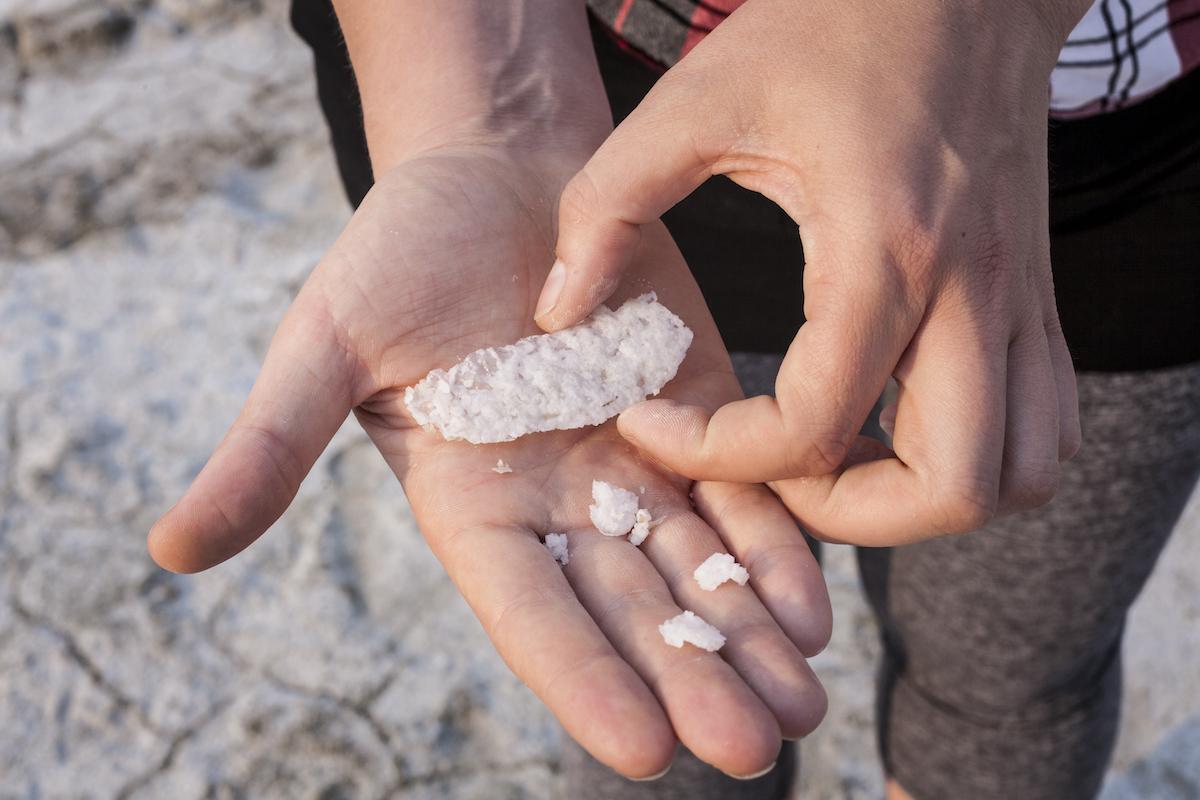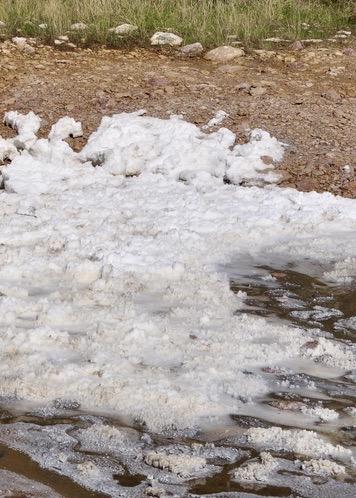
Salt from the salt plains of Wood Buffalo National Park/NWT Tourism
An Indigenous entrepreneur has gone public with Parks Canada’s demand that she stop harvesting salt from her homelands in what’s now Wood Buffalo National Park.
Melissa Daniels — who runs the small skincare company Naidié Nezu (“Good Medicine” in the Dene language) and goes by the handle @DeneLegalEagle — Tweeted that Parks Canada “restricts Indigenous rights to the point of extinguishment.”
The Fort Smith, Northwest Territories woman shared a March 21 letter from park warden Natasha Moore who noted that her Borealis Bath Blend is said to include “salt from our local salt flats” but that “removal of salt and any other natural objects from the park is prohibited.”
“Naidie Nezu is respected for its use of handpicked botanicals,” Moore noted. “However, we ask that salt from the park stay in the park, and not be sold as an ingredient in the bath blend of other products.”

The salt plains in Wood Buffalo National Park/Parks Canada, S. Irwin
Daniels Tweted: “My ancestors have lived in this area for thousands of years & Parks states I’m no longer allowed to harvest salt on my homelands even though this is the only place I’m able to find it. #reconciliation.”
Chief Allan Adam of the Athabasca Chipewyan First Nation (ACFN) put out a statement encouraging Canadians to buy the products.
“The Dëne have resided in what’s now called Wood Buffalo National Park for at least 11,000 years,” he wrote. “We have a treaty, signed with the Crown that guarantees access and use of this territory.” But ACFN members have been denied access and use of the territory, he said, and the hope has been to “resolve this historic injustice” before the park’s 100th anniversary later this year.
Adam called the Parks Canada letter to Daniels “yet another reminder that Canada is still in the very early days of reconciliation.”
His statement included a comment from Daniels who said: “I am (in) no way, shape or form a threat to the ecology integrity of our homelands and having Parks Canada imply otherwise is insulting to me, our nation, our ancestors and the land itself. As such, I will continue to harvest salt because like my ancestors, the land sustains me & I refuse to let the land-based relationships we have nurtured for our future generations be extinguished by Parks Canada’s continued legacy of colonial wrongdoings.”
Canada’s largest national park spans the Northwest Territories and Alberta and protects free-roaming bison herds.



Comments
Sorry m'am: demanding that you find another source for your salt is not "extinguishing" anything or anyone.
If you wish to be taken seriously, be serious.
Can't we have any places free from human exploitation? It doesn't matter how long your ancestors have been doing it.
For those who believe this salt is somehow special, I've got a salt mine to sell them.
I'm pretty sure that treaty obligations in Canada are supposed to be met. Granted I read the treaty and it mentions the agreement is with the Queen, who at this time is long dead, but I'm sure that it's just a formality and that it transfers to the Canadian governement. However, I saw language that specifically mentioned hunting, trapping, and fishing, but not harvesting.
That being said, here's an interesting position piece on this same subject.
I'm pretty sure that treaty obligations in Canada are supposed to be met.
They sure are, but it's a two-party agreement, and there are ways to settle disputes. Continuing to expolit the salt deposits-- for her own financial gain--within the park without permission of the Crown is a violation of that treaty...by Ms. Daniels. Defending that illegal use (currently) by resorting to over-the-top claims about being "extinguished" is shameful and cynical.
I'm sure you're aware that (similar to the United States) treaty obligations have often been ignored by the Canadian government.
She's an attorney as well as a businesswoman, so I suppose she's used to using legal language. I looked up her work, and she specializes in environmental and Aboriginal law. The salt harvesting is apparently fairly minimal as it's not anything like a mining operation but small amounts of hand-collected salt using traditional collection methods. In the past, this salt was harvested by non-indigenous settlers in small quantities.
https://www.cbc.ca/news/canada/north/melissa-daniels-won-t-stop-harvesti...
I'm not really all that sure what the deal is. At least in the United States, limited collecting is actually allowed in some national parks, depending on what it is. For any kind of commercial use may not be allowed though. There are usually limits on things like mushrooms and edible berries. I remember being in Yellowstone, where a park ranger advised the group he was leading that if we saw any wild strawberries, we were welcome to pick a few.
And in the United States there has been a move to restore indigenous rights, such as the right of the Timbisha Shoshone to their homelands in what's now Death Valley National Park. Many were forcibly removed over the years.
She's an attorney as well as a businesswoman, so I suppose she's used to using legal language
Claiming that the denial of her ability to mine this salt for personal financial gain is "extinguishing" something is not legal--it's inflammatory and unserious. Come on, don't exuse it.
I'm sure you're aware that (similar to the United States) treaty obligations have often been ignored by the Canadian government.
Treaty obligations were often ignored by natives as well. The Sioux were particulary adept at playing the game when one familial group made a treaty with the US (and exploited the fruits of that treaty), while other familiial clans ignored it.
This condescending attitude that natives (in Canada or the US) were without agency is to dehumanize them. Let's stop it ... now.
Please, can we take a broader, more-in depth view of the history?
In contract law parlance, "extinguish" means to void or destroy a contract or right. She's arguing that this is basically not fulfilling the terms of the treaty when she can't collect salt on her peoples' ancestral lands. But I suppose you want to paint this one person in worst possible light.
You're really going to parse every word for the most inflammatory meaning? Really?